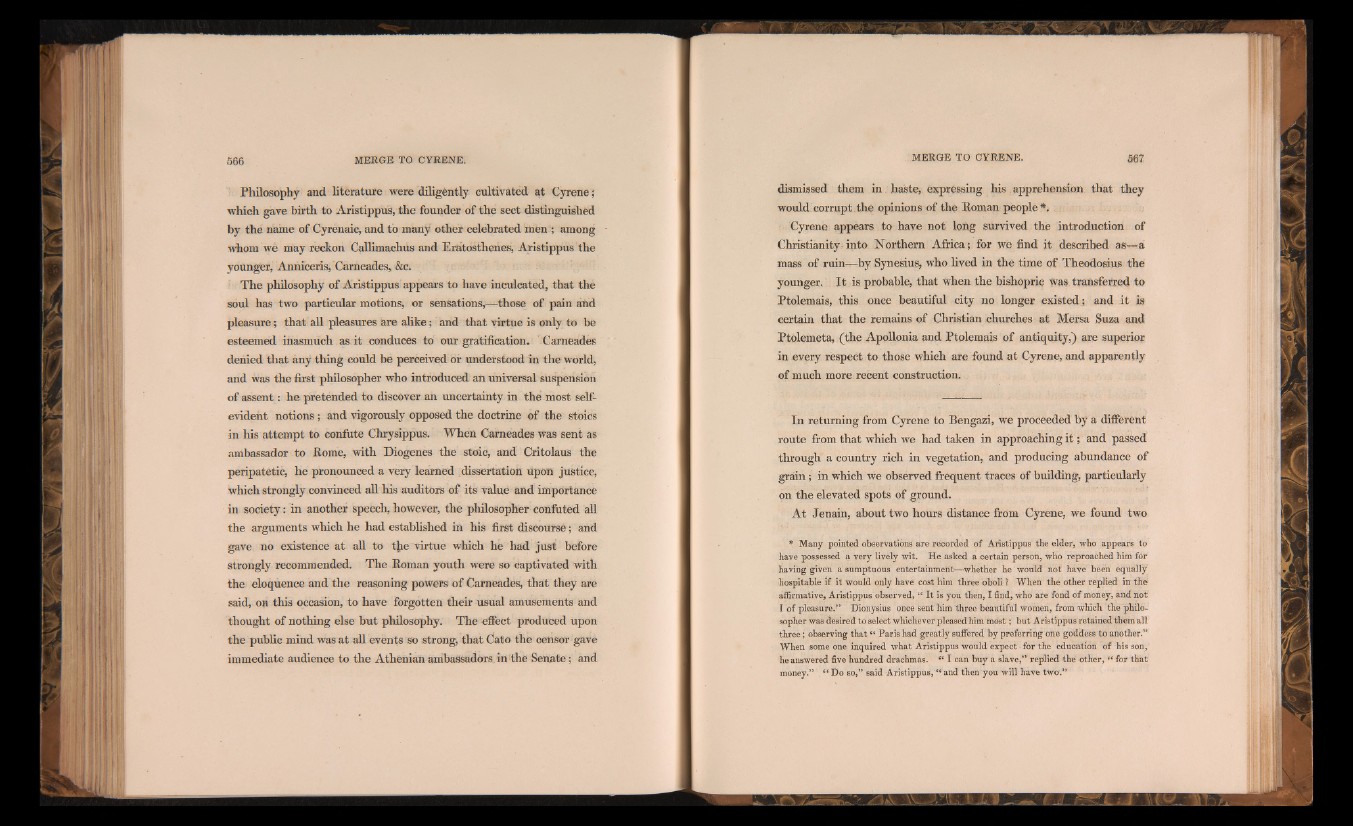
Philosophy and literatuïe were diligently cultivated at Gyrene ;
which gave birth to Aristippus, the founder of the sect distinguished
by the name of Cyrenaic, and to many other celebrated men ; among
whom we may reckon Callimachus and Eratosthenes, Aristippus the
younger, Anniceris, Carneades, &c.
The philosophy of Aristippus appears to have inculcated, that the
soul has two particular motions, or sensations,—those of pain rind
pleasure ; that all pleasures are alike ; and that virtue is only to be
esteemed inasmuch as it conduces to our gratification. Carneades
denied that any thing could be perceived or understood in the world,
and was the first philosopher who introduced an universal suspension
of assent : he pretended to discover an uncertainty in the most self-
evident notions ; and vigorously opposed the doctrine of the stoics
in his attempt to confute Chrysippus. When Carneades was sent as
ambassador to home, with Diogenes the stoic, and Critolaus the
peripatetic, he pronounced a very learned dissertation upon justice,
which strongly convinced all his auditors of its value and importance
in society : in another speech, however, the philosopher confuted all
the arguments which he had established in his first discourse ; and
gave no existence at all to tjje virtue which he had just before
strongly recommended. The Roman youth were so captivated with
the eloquence and the reasoning powers of Carneades, that they are
said, on this occasion, to have forgotten their usual amusements and
thought of nothing else but philosophy. The effect produced upon
the public mind was at all events So strong, that Cato the censor gave
immediate audience to the Athenian ambassadors in the Senate ; and
dismissed them in haste, expressing his apprehension that they
would corrupt the opinions of the Roman people*.
: Gyrene appears to have not long survived the introduction of
Christianity-into Northern Africa; for we find it described as—-a
mass of ruin—by Synesius, who lived in the time of Theodosius the
younger. I t is probable, that when the bishopric Was transferred to
Ptolemais, this once beautiful city no longer existed; and it is
certain that the remains of Christian churches at Mersa Suza and
Ptolemeta, (the ApoUonia and Ptolemais of antiquity,) are superior
in every respect to those which are found at Cyrene, and apparently
of much more recent construction.
In returning from Cyrene to Bengazi, we proceeded by a different
route from that which we had taken in approaching it ; and passed
through a country rich in vegetation, and producing abundance of
grain ; in which we observed fréquent traces of building, particularly
on the elevated spots of ground.
At Jenain, about two hours distance from Cyrene, we found two
* Many pointed observations are recorded of Aristippus the elder, who appears to
have possessed a very lively wit. He asked a certain person, who reproached him for
having given a sumptuous entertainment—whether he would not have been equally
hospitable if it would only have cost him three oboli ? When the other replied in the
affirmative, Aristippus observed, “ I t is you then, Ï find, who are fond of money, and not
I of pleasure.” Dionysius once sent him three beautiful women, from which the philosopher
was desired to select whichever pleased him most ; b u t Aristippus retained them all
three; observing that “ Paris had greatly suffered by preferring one goddess to another.”
When some one inquired what Aristippus would expect for the education of his son,
he answered five hundred drachmas. “ I can buy a slave,” replied the other, “ for that
money.” “ Do so,” said Aristippus, “ and then you will have two.”